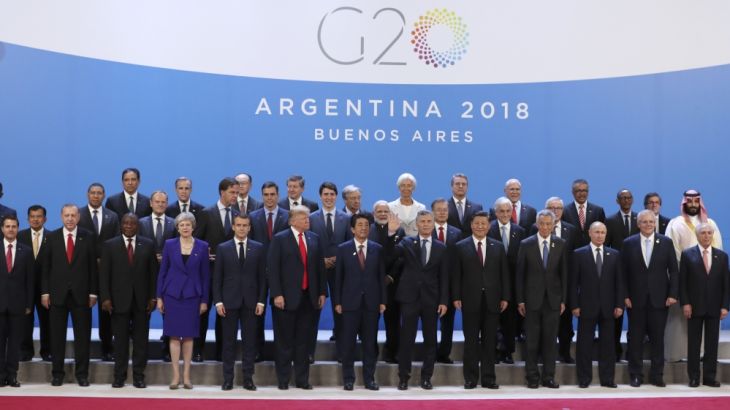
Is the G-20 facing an identity crisis?
These days, the group finds it hard to agree on almost anything let alone trade disputes, migration and climate change.
Nineteen leaders of the world’s biggest economies and a representative of the European Union are meeting in Argentina to discuss the world’s most pressing challenges during the G20 Summit. These are the group of countries that generate 80 percent of world output. They also burn more fossil fuels than the rest of the world.
The group was formed in 1999 but took on greater importance in the wake of the global financial crisis. However, these days the group finds it hard to agree on almost anything let alone trade disputes, migration and climate change.
Keep reading
list of 4 items‘We need you’: Solomon Islands’ support for US agency’s return revealed
Why are nations racing to buy weapons?
Parallel economy: How Russia is defying the West’s boycott
The G20 “still has its relevance, particularly at a time when we need good international economic institutions,” according to Tim Harcourt, an author and economist. The group’s response to the global financial crisis in 2008 is a testament to the effect members can have when they work together. “It’s one of the few forums where you get the major powers together in a summit like this.”
In 2017, the United States turned its back on its commitment to the Paris Agreement – an agreement it was instrumental in brokering, thus isolating itself among G20 members. Argentina and member countries will also be focused on preventing the further deterioration of the G20’s commitment, as the US reaffirms its position and as new administrations reassess their commitments on climate.
””[The
still has its relevance, particularly at a time when we need good international economic institutions,”]
There’s an absence of consensus on climate change between member countries, because “in some ways the burdens aren’t being shared quite properly, and in some cases, they’re expecting developing countries to share some of the burden right at the time when industrialisation is actually pulling a lot of people out of poverty,” explains Harcourt, “so, they’re probably less willing to give up some of that momentum they’d been able to get in countries like China, India and Indonesia … I expect there won’t be much consensus on climate change in terms of causes, but also in terms of what solutions you use.”
While a host of issues are up for discussion, the G20 conference will also tackle issues surrounding data privacy, Harcourt points out. “In some ways, the G20 nations are geared by the great information age and the great information-rich capitalist institutions in the US and Japan where they’re using data mining for consumer-driven behaviour, while countries that have a bigger tradition of social control like China are using data mining for social control with its own citizens … so, they’re both tackling the same issues of how to gather data but they’re putting them to quite different purposes.”
Zimbabwe one year on from Mugabe
It has been a year since the army overthrew Robert Mugabe, a strongman ruler for nearly four decades. Since then, the country’s president, Emmerson Mnangagwa, has been trying to revive Zimbabwe‘s ailing economy, only to fail at attracting much needed foreign direct investment.
Ordinary Zimbabweans are still worse off since Mugabe’s removal, according to Charles Robertson, the global chief economist at Renaissance Capital. “There’s still huge challenges, particularly on the currency and banking side. There’s still a lack of investment going into the economy.”
|
|
Ultimately, a country needs “three underlying things to industrialise and become a middle-income country”, points out Robertson. “Education, and Zimbabwe’s had a great education system for many decades; secondly, you’ve gotta have electricity, and Zimbabwe’s got plenty; and thirdly, you need high investment, and that’s where Zimbabwe’s been lacking.”
Also on this episode of Counting the Cost:
Zimbabwe economy: The country is trying to reboot its economy, one year on from the army coup that overthrew Robert Mugabe. President Emmerson Mnangagwa was elected last July, but his government is failing to attract much needed foreign investment. Thousands of Zimbabweans have been out protesting, as Haru Mutasa reports from Harare.
Gender pay gap: Women may face a much wider wage gap in the US than commonly cited data indicate, according to a new study by the Washington-based Institute for Women’s Policy Research. Economists analysed the incomes of men and women who worked for at least one year between 2001 and 2015 and found women earn just 49 cents to the typical men’s dollar – far less than the 80 cents usually reported.
General Motors plant closures: Thousands of jobs are set to go in the largest restructuring by US carmaker General Motors since the 2008 financial crash. The planned closure of five big car manufacturing plants in North America is a blow to President Donald Trump, who has promised to turn around the industry, as Shihab Rattansi reports.
Kenya’s ‘blue economy’: Protecting the world’s oceans by creating a sustainable water economy was the focus of thousands of entrepreneurs and environmental experts meeting in Kenya. The so-called “Blue Economy” is valued at six trillion dollars. At the end of the three-day conference, heads of government and agencies committed to put in place policies to build a sustainable blue economy, as Catherine Soi reports from Nairobi.